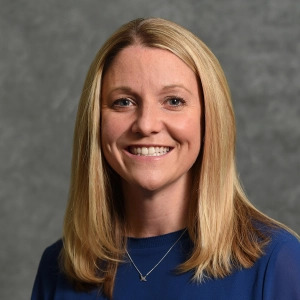Interview With Dr. Sarah Wallace of Duquesne University

Sarah E. Wallace PhD, CCC-SLP is an Associate Professor and Program Director for the Adult Language and Cognition clinic in the Speech-Language Pathology Department at Duquesne University in Pittsburgh, Pennsylvania. Dr. Wallace also directs the Communication and Cognition Lab. Dr. Wallace is a certified speech-language pathologist with clinical experience providing services to individuals with acquired communication disorders. Dr. Wallace conducts clinical research aimed at improving quality of life for individuals with communication impairments following traumatic brain injury and aphasia.
At Duquesne University, she teaches the following graduate courses: Aphasia in Adults, Neurocognitive Communication Disorders, Augmentative and Alternative Communication with Lab, and Capstone in Evidence-Based Practice. She also provides multiple guest lectures within the Health Science Departments focused on augmentative and alternative communication and interprofessional roles and responsibilities. Dr. Wallace regularly leads Interprofessional Education learning opportunities for Duquesne University students. In addition to her classroom and clinic teaching responsibilities, Dr. Wallace often mentors student research projects.
Dr. Wallace is a member of American Speech-Language and Hearing Association Special Interest Groups 2 and 12. She actively contributes in multiple services roles to the Academy of Neurogenic Communication Sciences and Disorders, the American Speech-Language-Hearing Association, and Aphasia Access. She proudly serves as a Co-Editor for Topics in Language Disorders.
Note: You should consult with your doctor or speech pathologist for recommendations on treatment. The views and opinions expressed in this article are those of Dr. Wallace and do not necessarily reflect the official policy or position of SpeechPathologyMastersPrograms.com
How did you become interested in researching aphasia?
I first learned about aphasia when I was at the University of Miami in Ohio for my undergraduate degree. I had the opportunity to study abroad with Dr. Louise VanVliet. During our travels in Eastern Europe, we went to Slovakia and had the amazing opportunity to spend time with an aphasia group there. I learned a great deal from working with that group and from Dr. VanVliet that I still use in my practice and teaching to this day.
Then, during my Master’s program, I worked closely with Mrs. Sandra Glista and Mrs. Robin Pollens, who taught me about group therapy for aphasia and the Life Participation Approach to Aphasia. I was fortunate to be involved in research with Mrs. Glista and that started me on a path to answer important clinical questions about people with aphasia.
What are currently the biggest challenges to getting people with cognitive and communication deficits in terms of receiving the treatment they need?
Probably the biggest challenge to receiving services relates to the funding available and regulatory procedures related to providing services. Advocacy is needed to bring about the changes that are needed to ensure appropriate services for individuals who we serve.
Why is interprofessional collaboration important when treating patients with aphasia
Interprofessional collaboration is essential to effective treatment for people with aphasia and their families. I learned this early on during my program at Western Michigan University and it was emphasized for me during my time as a speech-language pathologist at Quality Living, Inc in Omaha, Nebraska. As aphasiologists, we know the importance of treating people and their families as whole people and therefore, we need to collaborate with other professionals to be sure we are addressing other needs beyond communication such as spiritual, physical, emotional, social, and relational.
I have been lucky to work closely with an occupational therapist, Dr. Elena Dosono Brown, on some recent projects. Through our work together, we have been able to make our research materials for an upper extremity occupational therapy home program more aphasia friendly, thereby increasing the participation of people with aphasia in this type of research. Additionally, I have learned methods to make my treatments more functional in nature and to identify personalized needs of individuals as therapy goals. When we work together, I am always learning more and I believe in the end this helps me best serve the people with whom I work.
How does the Communication and Cognition Lab at Duquesne select new research projects?
I am fortunate to work closely with many colleagues across the country and world. Within the research lab, we focus on projects that we believe will have a direct effect on the lives of people with aphasia. As part of this focus, many of our studies explore the use of compensatory strategies for people with aphasia and other neurogenic communication disorders. Our current, NIH funded project is a collaboration with some top-notch researchers – Dr. Jessica Brown, Dr. Karen Hux, and Dr. Kelly-Knollman-Porter. As part of this team, we are exploring ways to address comprehension deficits experienced by people with aphasia. Our research is motivated by information provided by people with aphasia and is grounded in our continued focus on clinical applicability.
What aspect of your research are you most proud of?
The most fulfilling aspects of my research are:
- The opportunity to work with people with neurogenic communication disorders and their families
- The interprofessional and interdisciplinary nature of many of our projects
- The involvement of students in research
What is your advice for future speech pathology students?
First, I would congratulate speech-language pathology students for selecting an amazing field in which to work. Our field is broad and filled with many rewards. I would advise students to focus on their goal of providing the best possible care for people with communication and swallowing disorders. With this goal at the forefront, I think students can be intrinsically motivated even during the toughest of times.
My second piece of advice is to get involved. There are so many opportunities with our professional organizations, specialized organizations, and regional/state organizations. Advocacy for our profession and for the people who are lucky enough to serve is critically important. I have also found that these opportunities to give back to the profession have helped me develop and grow as a person and professional. Their value is immeasurable.
Sponsored online speech pathology programs

Online MS: Pursue SLP Certification. Study FT/PT
Speech@Emerson enables you to earn an MS online and pursue SLP certification in as few as 20 mos. Learn the same curriculum as the on-campus program. Study FT or PT.
- Prepares you to pursue certification as an SLP generalist
- In-person clinical placements at faculty-approved partner sites
- As few as 20 months to complete
SPONSORED

Want to Become an SLP? Earn an MS Online at NYU
NYU Steinhardt’s online master of science program in Communicative Sciences and Disorders prepares aspiring speech-language pathologists with a comprehensive professional education.
- Prepares students to pursue SLP licensure
- Accredited by ASHA’s Council on Academic Accreditation
- As few as six terms to complete
- Full-time and part-time plans of study
SPONSORED

Online MS in Speech-Language Pathology from Pepperdine University
Pepperdine University’s online Master of Science in Speech-Language Pathology program combines a robust, innovative curriculum rooted in Christian values with a full-time or part-time option that features online learning, on-campus intensive experiences, and comprehensive clinical field practicums to prepare skilled, compassionate students for careers as speech-language pathologists.
- Full-time (five trimesters) or part-time (eight trimesters) options available.
- No GRE scores required.
- 400+ supervised, clinical learning hours are done at schools/clinics local to students
- Three onsite experiences build a sense of camaraderie and community throughout the program
SPONSORED

